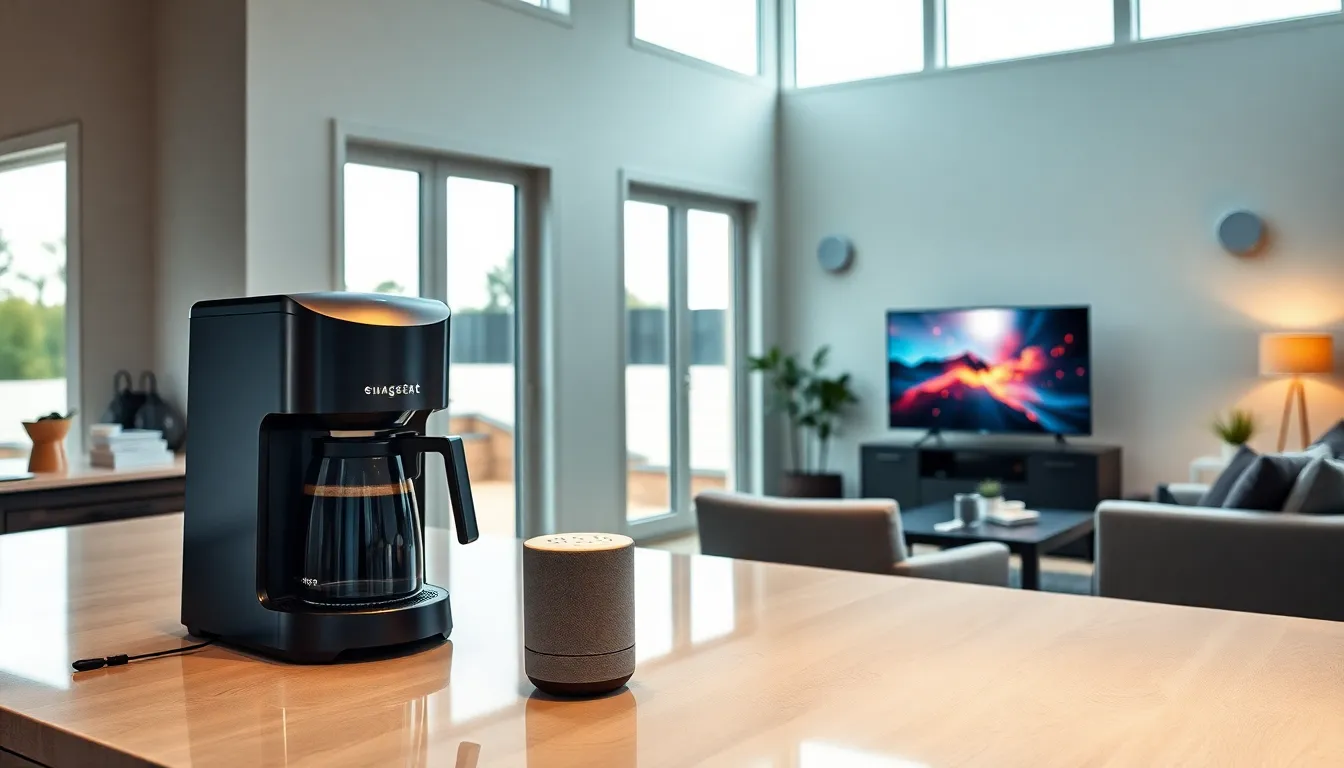Imagine walking into your home and having it greet you like an old friend. With AI-driven smart homes, this dream is becoming a reality. These tech-savvy abodes don’t just listen—they learn, adapt, and even anticipate your needs. From adjusting the thermostat to brewing your morning coffee, your home can now be as smart as your phone, minus the constant updates.
But let’s be real: who wouldn’t want a home that can turn off the lights with a simple voice command? With AI at the helm, daily chores become a breeze, leaving more time for the important stuff—like deciding what to binge-watch next. Dive into the world of AI-driven smart homes and discover how they can transform your living space into a futuristic haven that’s both convenient and a little bit sassy.
Table of Contents
ToggleOverview of AI-Driven Smart Homes
AI-driven smart homes integrate advanced technology to create a responsive living environment. Devices within these homes learn and adapt based on user preferences. Smart speakers respond to voice commands, enabling control over various aspects of the household, such as lighting and temperature.
Energy management systems play a crucial role in optimizing power usage. They monitor energy consumption patterns and advise on efficiency improvements. Homeowners often observe reduced utility bills as a result. AI algorithms also enhance security through surveillance cameras and motion detectors.
Connectivity is fundamental in AI-driven smart homes. Various devices communicate seamlessly to work harmoniously. For instance, smart thermostats may adjust settings based on occupancy detected by motion sensors. This integration results in both comfort and energy savings.
Home automation can include scheduling features and remote control capabilities. Homeowners often utilize apps to manage their smart devices from anywhere. Automation increases convenience, allowing for tasks such as locking doors or checking security cameras while away.
Personalization is a unique feature of AI-driven smart homes. Homeowners experience tailored suggestions based on their behavior and routines. Over time, the system learns individual preferences, enhancing overall user experience. As technology continues to evolve, AI-driven smart homes offer increased functionality and ease of use.
The potential for innovation remains high. Future developments promise to make smart home technology even more intuitive and efficient. Overall, AI-driven smart homes significantly enhance daily living and elevate the overall quality of life.
Key Features of AI-Driven Smart Homes

AI-driven smart homes offer a variety of features that enhance living spaces through advanced technology. Smart systems create a comfortable, efficient, and secure environment for residents.
Automation and Control
Home automation simplifies daily tasks by integrating various devices into a unified system. Voice-activated controls allow users to operate appliances, adjust thermostats, or dim lights seamlessly. Routine schedules for devices facilitate energy savings and enhance convenience. Smart assistants, such as Google Assistant or Amazon Alexa, respond to simple voice commands, providing effortless control. Each device communicates with others for streamlined operation, enabling users to manage their homes effectively from anywhere via mobile apps. Remote accessibility transforms how homeowners interact with their living spaces, ensuring comfort and efficiency at their fingertips.
Energy Efficiency
Energy efficiency emerges as a core feature of AI-driven smart homes. Intelligent energy management systems monitor usage patterns and optimize power consumption accordingly. Smart thermostats adjust heating and cooling based on occupancy, saving energy when no one is home. Data analytics identify energy-hungry devices, prompting homeowners to make informed decisions. Automated lighting adjusts to the time of day, ensuring lights operate only when needed. As a result, residents experience lower utility bills while contributing to environmental sustainability. Integration with renewable energy sources like solar panels enhances the home’s energy profile further.
Security Systems
AI-driven smart homes prioritize security through advanced surveillance and monitoring systems. Smart cameras provide real-time video feeds accessible via mobile devices, allowing homeowners to view their properties from anywhere. Motion detectors trigger alerts when unusual activity occurs, prompting immediate response. Smart locks enable keyless entry, increasing safety by allowing users to grant access remotely. Additionally, integrated alarm systems react automatically to breaches, enhancing overall security. These features not only deter intruders but also offer peace of mind for residents, knowing their homes are protected at all times.
Benefits of AI-Driven Smart Homes
AI-driven smart homes offer numerous benefits that enhance daily living through advanced technology integration. These homes adapt to individual preferences, making life easier.
Convenience and Comfort
Smart homes automate tasks to streamline daily routines. Voice commands control lighting, temperature, and appliances, allowing users to focus on important activities. Scheduling functions enable users to set their devices, ensuring their home environment aligns with their routines. Smart speakers connect seamlessly with other devices for effortless interaction. The ability to remotely manage systems through smartphone apps enhances flexibility. A personalized environment emerges as the AI learns habits and preferences of users, creating a tailored living space.
Cost Savings
AI-driven smart homes lead to significant cost savings on utility bills. Intelligent energy management systems analyze usage patterns to optimize power consumption. Homeowners benefit from adjusting settings based on occupancy and time of day, reducing waste. Energy-efficient devices contribute to lower operating costs while promoting sustainability. Reports indicate potential savings of up to 30% on energy bills annually. In addition, automatic monitoring alerts users to unusual consumption, allowing for immediate intervention. Long-term financial benefits arise from these systems, making smart homes a wise investment.
Enhanced Security
Advanced security systems provide peace of mind in AI-driven smart homes. Surveillance cameras and motion detectors integrate with smart home technology for real-time monitoring. Alerts notify homeowners of any unusual activity, ensuring swift responses to potential threats. Automated responses enhance security, such as locking doors or activating alarms upon detection of intruders. AI algorithms identify unusual patterns, helping to prevent break-ins before they occur. The convenience of remote monitoring allows users to check their home from anywhere, boosting confidence in their safety.
Challenges and Considerations
AI-driven smart homes present unique challenges and considerations that potential users must navigate. Understanding these issues helps ensure a seamless integration of technology into everyday life.
Privacy Concerns
Homeowners often voice concerns regarding data privacy in AI-driven smart homes. Advanced devices collect personal information to provide tailored experiences, which raises questions about data storage and usage. Risks of unauthorized access to sensitive information also exist, particularly with connected devices. Transparency from manufacturers about data handling practices can mitigate these worries. Establishing strong security measures, including encryption and secure passwords, offers further protection against potential breaches.
Integration Issues
Integrating multiple devices poses challenges for smart home systems. Compatibility among different brands and technologies often creates hurdles. Users might encounter difficulties when attempting to execute seamless communication between devices. Solutions include researching products that adhere to common standards or platforms. Regular updates from manufacturers can also enhance device compatibility and performance. Simplifying the setup process and providing clear user instructions help create a smoother experience for homeowners.
Future Trends in AI-Driven Smart Homes
AI-driven smart homes continue to evolve, showcasing emerging trends that transform daily living. Integration of advanced machine learning algorithms enhances device responsiveness, making interactions smoother and more intuitive. Predictive analytics plays a significant role in personalizing user experiences based on individual habits and preferences.
Automation features advance, enabling homes to anticipate needs rather than just respond to commands. Voice assistants become more intelligent, streamlining control over various devices and making them more user-friendly. Energy management systems innovate further, utilizing real-time data to dynamically optimize electricity use, potentially saving homeowners up to 30% on energy bills annually.
Security trends also show a noticeable shift, with AI enhancing surveillance with facial recognition and anomaly detection. Smart cameras now learn to differentiate between normal activity and potential threats, providing enhanced peace of mind. Remote monitoring capabilities evolve, allowing homeowners to access live feeds and security alerts from anywhere via mobile apps.
Smart appliances are another area of rapid growth, offering convenience and efficiency. Refrigerators can now track inventory and suggest recipes based on available ingredients, while washing machines optimize cycles based on fabric type and load size. Enhanced connectivity between devices ensures streamlined operations, creating a more cohesive smart home ecosystem.
Sustainability is gaining traction, with smart homes incorporating eco-friendly technologies. Solar panels and energy storage systems work in harmony with smart grids to promote sustainable energy usage. Homeowners benefit from a reduced carbon footprint while enjoying lower utility bills.
Overall, AI-driven smart homes will shape the future of residential living through innovation, enhanced comfort, and sustainability. These advancements underscore a shift towards more efficient, secure, and user-friendly environments that cater to individual needs.
AI-driven smart homes represent the future of living spaces where technology and comfort seamlessly blend. These homes not only enhance daily routines but also prioritize energy efficiency and security, making life easier and more sustainable. With the ability to learn and adapt to individual preferences, they create personalized environments that cater to unique lifestyles.
As advancements continue to unfold in this field, homeowners can look forward to even more innovative features that enhance convenience and safety. Embracing these technologies allows individuals to transform their homes into smart havens, paving the way for a more efficient and enjoyable living experience.






